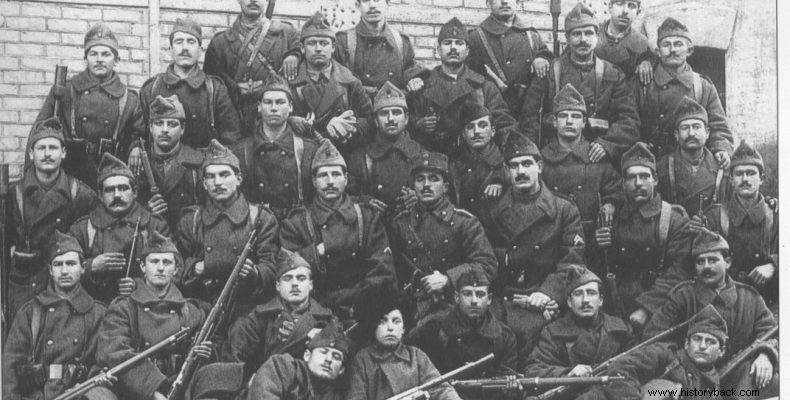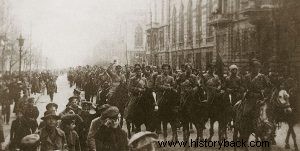
After the decision to intervene against the Bolsheviks in Ukraine, the French sent meager forces to the region, also requesting Greece's assistance. El. Venizelos agreed and ordered the dispatch of the 1st Army Corps. The first Greek unit to arrive in Ukraine was the heroic 34th Infantry Regiment (IP) of Piraeus. On January 11, 1919, the French decided to send forces to the city of Kherson. The detachment formed for the mission in question consisted of the I/34th Infantry Battalion (I TP of the 34th SP), a reduced company of the French 176th SP and other small French units, under the French Major Lanchon.
The Greek order, with its arrival, helped to consolidate order. On February 17, the Bolsheviks launched their first attack on the city but were repulsed. So they prepared more intensively. In the meantime, the allied forces in Kherson were reinforced. On February 22, when the Bolshevik attack was repeated, the defenders had I/34TP under Major Konstantinos Vlachos or Prassos, the 1st and 2nd Companies of the Greek I/7TP (1/7, 2/7 Companies), two reduced French infantry companies and a machine gun platoon and two French ulamas with a total of four 65mm guns.
These forces were deployed as follows: The 1st Company of I/34TP (1/34 Company), under Lieutenant Mathios , had arrived at the city's railway station. In the suburb of Boyena, the 1/7th Company and a French company had been deployed. In the suburb of Zampolka, the 2/7 Company and the other French company were deployed. A section of the 2/34th Company was deployed in the port, while the remaining forces of the I/34TP were deployed in the fortress of the city. The 1/34 Company had been reinforced with two Greek and four French machine gun elements.
Mass feed
Around 09.00 on the morning of February 22 enemy masses, of the 17th Division of the Soviets of ataman Grigoriev, supported by artillery and the fire of armored trains, they rushed out. It is worth noting that Grigoriev, on February 16, had a telephone conversation with the Greek lieutenant Ilias Mathios, commander of the 1/34th Company guarding the railway station, asking him to lay down his arms. emphasizing to him the overwhelming numerical superiority of his forces. "But don't forget Thermopylae and be convinced that when the Greeks find themselves in the need to strike, they strike Greek", was the brave lieutenant's answer.
The attackers particularly pressed the forces in the suburb of Boyena and the railway station. In Boyena the Bolsheviks forced the 1/7th Company to retreat, but were repulsed by a counter-attack with the lance . But gradually the Bolsheviks came back with overwhelmingly superior numerical forces. The attackers captured the town's telegraph and telephone office, nearly surrounding the defenders at the railway station. The French leader, Major Lanchon, seeing the situation, asked for reinforcements. But only 130 men were available and they could not arrive earlier than noon the next day by steamer from Odessa.
In Chersona the battle progressed fiercely with the Greeks fighting heroically, repelling the enemy and holding their positions until night fell. Then they managed to regain some lost positions. In the evening the 1/34th Company was replaced at the railway station by the 3/34th Company. The next day, February 23, the Bolsheviks resumed the attack. the 1/7th Company was forced to retreat from Boyena by pressing towards the fort. The 1/34th Company was sent to reinforce him. The two Greek companies together performed miracles and repulsed the enemies three times. The numerical superiority of the latter was depressing.
The brave lieutenant Mathios was treacherously shot by a woman and replaced by lieutenant Capeto. In the meantime, the pressure of the Bolsheviks became unbearable both at the railway station and in Zampolka. Nevertheless the defenders held out until darkness fell and the attacks relaxed . Lanchon then decided to leave the city. But at 18.15 the 130 men arrived from Odessa and apparently believing that additional reinforcements would be sent, as they were, he changed his mind.
The next day, February 24, the Bolsheviks launched their attack at 06:00 in the morning and succeeded in capturing the railway station. The 3/34th Company retreated normally, receiving also its wounded. The one French company meanwhile was trapped but managed to retreat to the port. From that moment on, however, confusion prevailed. Major Vlachos lost contact with Lanchon. Around 13.30 the Bolsheviks launched an attack against the fortress. Major Vlachos, enlisting even the clerks and the cooks, repelled them. But the situation was now tragic. The machine guns had "melted" from overheating and the ammunition was running out.
French quadrilles and departure
Fortunately, reinforcements did arrive. It was the Greek 1st SP under Lt. Col. Nikolaos Rokas with his I/1st Battalion. They were also accompanied by the infantry commander of II MP colonel Gargalidis and the French Lieutenant-Colonel de Clavier who, wrongly, since Gargalidis was superior, took over, rightly so, the administration. Gardalides, in consultation with the French, ordered the I/1TP to disembark from the ships and make contact with the Greeks blockaded in the fortress.
There the situation was tragic and Vlachos, as there was no more ammunition, with the consent of his men, had decided to carry out a spear attack ensuring a glorious and honorable death. Their sacrifice was ultimately unnecessary as at 17.15 a patrol of the I/1TP came into contact with them. In the meantime, the ship carrying II/1TP, which Gargalidis put in readiness, also arrived at the port. At the same time de Clavier did not know what to do. When Gargalidis did not ask him about the practice, he got angry!
Keeping his cool against the arrogant Frenchman,the Greek colonel continued to ask him what would happen, would they withdraw or continue the fight? Finally he decided to leave. In the meantime, Gargalidis ordered the disembarkation of a platoon of the II/1TP to assist the retreat of the Greek forces closed in the fortress. The withdrawal began in the early hours of February 25 and was generally completed successfully. However, all the guns and seven Greek machine guns were abandoned, along with all the transports of the I/34TP, and a few Greek soldiers did not manage to get on board.
Immediately after the withdrawal of the allied force, the 17th Soviet Division entered the city and was confronted for three days by five Greek rifle companies and a machine gun company together with about 200-250 Frenchmen. The Greek and Jewish inhabitants of the city who had requested the protection of the Allied forces were mercilessly massacred by the Bolsheviks, along with a few Greek soldiers who lost their bearings at night and failed to board the ships . The battle of Kherson was particularly bloody for the Greeks. Arms. A total of 117 Greeks were killed and 140 were injured. The French had 11 dead and 21 wounded.

Soldiers of Ataman Grigoriev's army.
